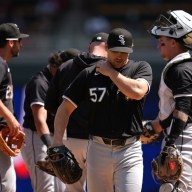 Paul Schneider plays a man dealing with a sudden divorce in “Goodbye to All That.”
Paul Schneider plays a man dealing with a sudden divorce in “Goodbye to All That.”
Credit: Getty Images
Paul Schneider doesn’t live in L.A. He used to. “It wasn’t my thing,” he says. He’s in Brooklyn, and these days he’s happy to act as infrequently as possible. That hasn’t always been so. He first came to prominence when his friend David Gordon Green directed his script of “All the Real Girls,” which starred him and Zooey Deschanel. He’s popped up in Cameron Crowe’s “Elizabethtown,” Andrew Dominik’s “The Assassination of Jesse James by the Coward Robert Ford” and Jane Campion’s “Bright Star.” And he was on the first two seasons of “Parks and Recreation.” But now he prefers to take things easy, stay out of the game and enjoy the simple things.
One film he did want to do was “Goodbye to All That,” the directorial debut of “Junebug” cowriter Angus MacLachlan, which plays the Tribeca Film Festival. He plays Otto, an oblivious man-child who is surprised when his wife (Melanie Lynskey) suddenly asks him for a divorce. He proceeds back into the world of dating, which he finds a lot easier thanks to the Internet.
The tone is very strange. There are absurdist, comic elements, but Lynskey’s character seems to be in a more serious film. How did you handle the comedy?
I think better actors than me have taught us that if you take these situations seriously, you make them funnier. Otto finds himself in a world of ease and technology, and suddenly he’s able to have sex with these beautiful women. No one’s using eachother, and it’s not sex with ulterior motives. It’s adult consensual sex, and that world is fascinating to him, and he can only laugh at the joy of it.
He’s very oblivious, which is not to say he’s uncaring.
I think he’s a loving person. He’s not a cynic. I think he’s not multi-layered. In fact, maybe the point of the film is he adds one layer. If he was slicker or more lascivious, then maybe they’d be having sex for different reasons. But I think he appreciates the beauty of these women. He doesn’t just like sex. He likes women, in a distanced way, almost like art appreciation class.
How much did you and Lynskey talk about your characters’ history and what led up to the breakup?
She and I talked a little bit. These are not thing I tend to remember. I don’t tend to remember very much at all. Melanie is a really dear friend of mine from years before. She actually encouraged me to read the script and consider it and to talk with Angus. She was a great cheerleader for my involvement. So I knew that working with her would be really easy. I think if you work on the scenes that you’re playing enough, the back story — that work will feel like it’s been done.
But it’s tough, because you’re under a lot of pressure. You’ve got 19 days to get this s— correct. And you’re filming in one or two takes. Essentially you’re doing something for the first time and you are filming it, and it’s very possible that the very first time you do something will be what is shown to possibly a large number of people. What other profession in the world do you take something you’ve never practiced before and beam that out to potentially an enormous number of people?
The idea of a rehearsal process is laughable. There is never a rehearsal process in film. Jane Campion fought really hard for two weeks of rehearsal for “Bright Star,” and we got really close. But there’s always the tractor beam of production. There are people that need you for things, and you have to try on this costume and you need to get this physical and you need to go here and you need to go there. And the only time you have to figure out what you’re doing is when you’re alone before you start production.
And my process — I say “process,” but I honestly don’t have a clue what I’m doing. Every time I do a film I find myself Googling “how to act.” I did this French musical [“Beloved”] where I had to break down and cry. The night before I was nervous and Googling “how to make yourself cry” and “how to act” and “how to act in sad movies.”
You’ve done plenty of indies and smaller films. What is it like being on a bigger one — like your appearance in Zhang Yimou’s “Flowers of War,” the most expensive movie in Chinese history?
That one was really interesting because I was big fan of “Ju Dou” and “Raise the Red Lantern,” and later “House of the Flying Daggers.” I just wanted to meet him, in the same way that I wanted to meet Jane Campion. I actually went to film school because I saw “The Piano.” I saw that film and I wound up studying film editing, and then 12 years later she called me up, because she saw “The Assassination of Jesse James.”
How has the indie film scene changed since you entered it a decade ago?
Right now I think it’s a very difficult time for people trying to do anything small and unique. Apparently they can’t pre-sell foreign markets based on their name recognition. This is all matrixes put together by financing companies that, in the end, don’t mean anything. But they think it’s a guarantee on their capital investment, which it isn’t really. It’s sad because it limits the possibilities for actors who are actually making smarter, more discerning, less sell-out, hopefully more Fugazi choices in a world when people don’t even know what sell out means anymore.
I’m not here to judge and everyone makes the choices that they make. Some people have sick relatives and people they need to support. But I know that if I made choices solely based on the money — I have to live with myself. I have to wake up with myself every morning. My overhead is really low, and I don’t live a coke-and-whores lifestyle. I never studied acting. Maybe a reason for my moderate success in this business is because acting is something I don’t need to do.
Where do you see yourself going in film?
If I have any future in this business it’s only because I keep a certain distance from it. You need grist for the mill, and you need other influences, and you need to daydream, and you need to look at people as they wander around Times Square, and to stop and thumb through a book, and you need to travel and you need to do other shit. If you keep your overhead low you can do that stuff. What do I need to that I don’t have? I have an amazing shower. I have a great bed. My girlfriend and I have long conversations about how hot water comes out of the wall and sprays you with a gorgeous comforter of warm liquid. How luxurious! I don’t know maybe I’m a simple pleasures kind of guy. I’m too sensitive a person to have my nose buried in Hollywood Reporter every day. It’s really a wonderful spot to be in the more I realize I need less to make me happy.
People will always look at your older work. “The Assassination of Jesse James” finally has more respect than it did when it came out in 2007.
I talked to somebody who went to [a screening of that in Queens]. It was funny because someone was saying, “Oh, it’s too bad, you could have been there.” And I was like, “I was probably in Greenpoint watching ‘Frontline’ while that was happening.” I’m not unreachable. It’s funny, sometimes I’ll hear of a group of friends who did something really fun over the weekend. And I’ll be like, “Why didn’t you call me?” And they say, “Well, we were sure you had some really exciting, celebrity, actory s— to do.” I was like, “No, I was making burritos and I was watching ‘America’s Funniest Home Videos’ at home. And I wish you would have called.”
What are your hopes for the future in this business?
All I want do is be in a Leos Carax movie. And I want to be in a film by Roy Andersson.
But Roy Andersson doesn’t do actors and performances, really.
No. But regardless. I want to be in a Leos Carax film and I want to be in a film by Roy Andersson. And if those two wildly improbable things happen, I can consider this whole journey into film acting — something I never expected doing, a complete and — wild success. You could dig my grave right after that.
Follow Matt Prigge on Twitter @mattprigge
















